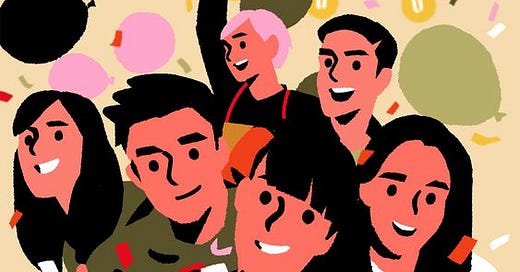Wealth, Fake Friends, and Relationships
A guide on cultivating authentic connections beyond the facade of success.
A common intuition about success and wealth is that it will inevitably attract a circle of predatory ‘fake friends’. How much truth is there to this idea, and what are some things you can do to keep making genuine connections and robust friendships?
When Amazon acquired Twitch for $970 million in 2014, Justin walked away with a life-changing check. Since that time, he’s developed a philosophy on meeting new people within the context of his success, and dealing with so-called ‘fake friends’. The approach might sound surprising, but it involves being open and vulnerable instead of heightening your defenses.
Here’s what you need to know about wealth, friendships, and cultivating genuine relationships.
Casual acquaintances can always evolve into deeper relationships
Don’t shy away from meeting strangers, even if you know they might need something from you or vice versa. While connections based on the shaky foundations of transaction are not the ideal end-goal, these initially superficial relationships are opportunities to grow into real, robust, and lasting friendships.
“A stranger is a friend you don’t know yet.” - Yes Theory
Most people, once they hit their late twenties to early thirties stop trying or don’t feel the need to make new friends. This is often not a conscious choice - but it might be the result of internalized frameworks of antagonizing social interactions with strangers.
Keep an open-minded approach to everyone you meet as someone you could potentially learn something from. Be it a successful billionaire, a stranger in a coffee shop, or your Uber driver; it is almost a certainty that both parties will be able to impart something valuable to one another.
What you learn might not necessarily be an immediate skill that someone can teach you, or actionable advice that solves all your deepest or most troubling problems. You may not even speak the same language. But viewing every relationship as an opportunity to learn is a powerful mindset to develop.
Sonder n. the realization that each random passerby is living a life as vivid and complex as your own—populated with their own ambitions, friends, routines, worries1
People have a lot more in common than you might think, and that’s a great place to start. Finding the things that unite us are what facilitates our deepest learnings about one another, and the most effective way to meet new people.

Be helpful.
Building meaningful relationships is all about knowing what the other person needs, and being there for them. This doesn’t mean you have to be a psychic and preemptively put out fires before they arise constantly. It simply means that you care enough to recognize patterns, behaviors, and recurring situations that might look like cries for help and doing your best to support the other person on their journey. Making yourself important to other people in a genuine manner is one of the greatest ways to build a meaningful relationship.
Be vulnerable.
The willingness to be vulnerable with others is often seen as a weakness, but it is actually the biggest strength you can have, especially when it comes to building genuine connections. When other people see you being vulnerable with them in an authentic way, they will feel closer to you. It signifies that you trust them, and they will reciprocate that with you.
Identifying real friends versus fake friends
It comes down to a question that you have to ask yourself: How do I feel when I’m with this person? Do you genuinely want to spend time with them? The human mind has great natural instincts to give you warning signs in the form of emotions, especially when you’re with people you don’t want to be around. Be respectful of your own time, and don’t waste it on people who make you unhappy.
But what if you want to fix a relationship with someone who is important to you? The answer is authentic honesty - if someone has done something to make you upset you should address it head on as soon as possible. Be vulnerable about how you feel; real and good friends will understand and be willing to heal your relationship together, while fake friends will be defensive, continue to hurt you, or give up entirely when it's convenient.
At the end of the day, the actions of others are outside of your control. The only things you can do are to be honest and alter the way you present yourself to the world. Be open-minded to connecting with new people, and be authentic in your approach. Fake friends are the people you leave behind as you discover who your real ones are.




